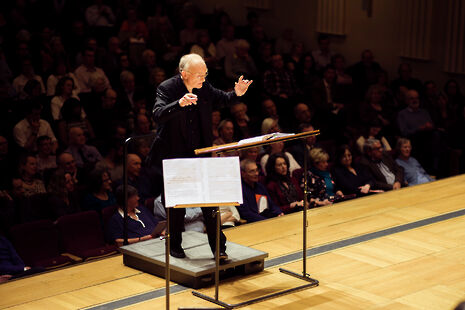Interview: John Rutter
Jared Bennett talks to the charming John Rutter, one of Britain’s favourite classical composers

It is rare to be able to interview a musician and composer of international fame, and even rarer to find one as unpretentious and as down-to-earth as John Rutter. The choral composer, whose career took off whilst he was studying at Clare College, Cambridge, now boasts a compositional career spanning over 50 years, and an oeuvre covering such diverse genres as opera, concerto and even a Mass. He has been instrumental in the popularisation of choral music both in England and abroad. I had the good fortune to have a chat with this stalwart of the contemporary English music scene.
Living in Cambridge, for John visiting a university-affiliated event isn’t an unusual occurrence; he in fact attended a concert of his own music put on at the end of Michaelmas term by the Trinity College Music Society – and I can say with confidence, having played in it, that it was immense fun. This is in part because of how comprehensible and feel-good his music is. What is his musical style? "Really, I’m more songwriter than composer… the gift of melody isn’t really wanted in the concert world." John, while always self-effacing, acknowledges his strengths, and considers his ability to write hummable melodies a particular talent. He advises: "If you have a special gift for one particular thing, try and get someone to pay you for it!"
But what of his origins here in Cambridge? "Most musical careers generally begin like throwing a pebble in a pond and the ripples spread outwards", he starts; "but with me, it was completely the opposite way round!" He tells me about how much he enjoyed composition in school, and then on coming to Cambridge how he was talent-spotted by the then director of King’s College choir, Sir David Willcocks, who also worked as a music editor for Oxford University Press. "He took several of my pieces [to the OUP offices in London] on Monday, and on Wednesday I got a letter back saying ‘we’d be very interested in publishing these pieces’". From there, John was approached to write anthems for church choirs in America (while he was still only a postgraduate), and finally he gained recognition in England. Were his colleagues jealous? "They [the pieces he sent for publishing] were nothing much to be jealous of!", replies John with his trademark mixture of wit and modesty.
In the past, his music has been criticised for its saccharine simplicity, but this isn’t the only dimension of his musical personality that has received attention. John is well known for writing music inspired by religion, and indeed the music he first submitted to Oxford University Press was a selection of Christmas carols. However, he describes himself as an agnostic, but says that this doesn’t surprise those in the know about music history, or indeed those who understand the creative process. "As far as I know, Shakespeare never wanted to murder his wife out of insane jealousy, but that didn’t stop him writing the most wonderful portrayal of it." For John, this is ample justification for his choice to use religious texts as a musical springboard. He explains; "You have to, as an artist, enter into states of being that are not your own. That’s what artists do… Vaughan Williams, who was deeply agnostic, edited the English Hymnal for goodness’ sake!" While he comes under fire for his seemingly conflicting stance as a prominent choral composer of religiously-inspired works, this doesn’t seem to be a problem for the many religious organisations for whom he has written music.
With such an impressive résumé and an international reputation to back it up, one might assume such a successful personality would be used to attention and praise. However, John still revels in stories he's heard of his music bringing joy to others. He tells us about receiving letters from grieving widows, who find comfort and solace in his music – he admits that it isn’t always easy to hear such stories. Nevertheless, it’s clear that John loves his work, and couldn’t imagine doing anything else. He sees his career as something special; it is not only something he loves doing, but also something that brings joy to people across the world. Yet, in his own words; "I’m still wondering what I’m really going to do when I grow up!"
 News / Hundreds of Cambridge academics demand vote on fate of vet course20 February 2026
News / Hundreds of Cambridge academics demand vote on fate of vet course20 February 2026 News / University Council rescinds University Centre membership20 February 2026
News / University Council rescinds University Centre membership20 February 2026 News / Judge Business School advisor resigns over Epstein and Andrew links18 February 2026
News / Judge Business School advisor resigns over Epstein and Andrew links18 February 2026 News / Petition demands University reverse decision on vegan menu20 February 2026
News / Petition demands University reverse decision on vegan menu20 February 2026 News / Caius students fail to pass Pride flag proposal20 February 2026
News / Caius students fail to pass Pride flag proposal20 February 2026









